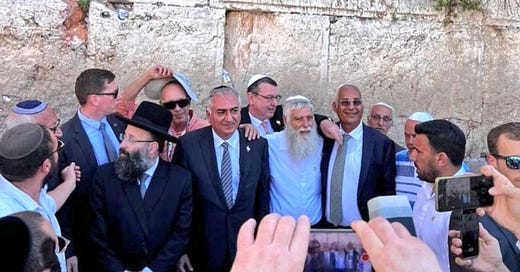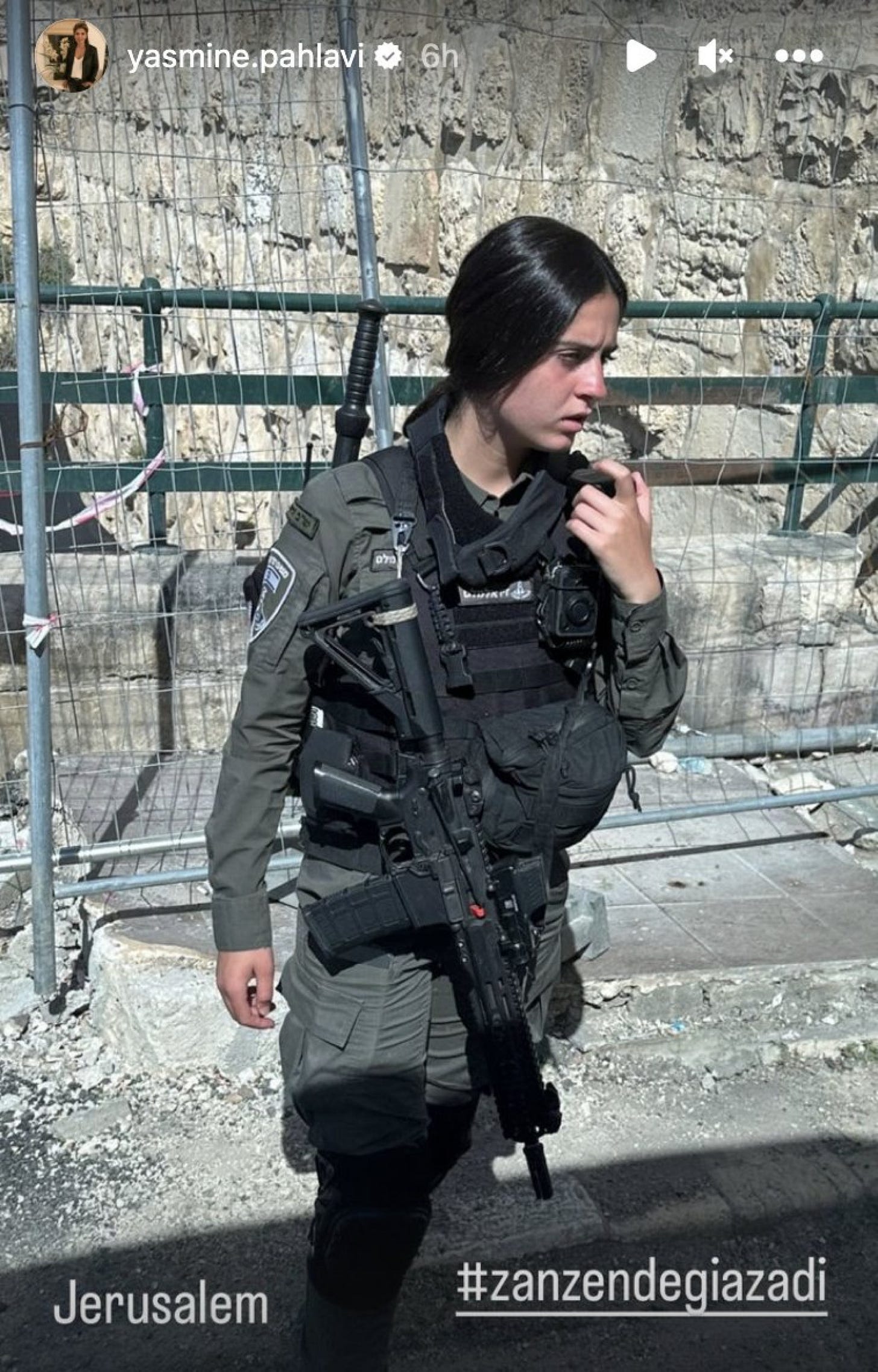New strains emerge in Iran opposition in exile
Reza Pahlavi’s visit to Israel comes amid tensions in Iran opposition movement over how much autonomy Iran’s ethnic minorities should have in a future democratic Iran, and Saudi Iran reconciliation.

As Reza Pahlavi, the son of the late Shah of Iran, travels to Israel this week, the western-based Iranian diaspora opposition, of which he is a leading member, has faced new divisions. Among the issues that has sparked tension is language in a recent opposition charter calling for the decentralization of power in Iran, a concession to Iranian Kurdish groups, Iranian diaspora sources said.
A half dozen prominent Iranian opposition diaspora figures, including Pahlavi; journalist and activist Masih Alinejad; and Iranian Kurdish activist Abdullah Mohtadi, held a panel at Georgetown University in February, vowing to unite to support Iranian protesters and help devise a roadmap to move Iran from an Islamic autocracy to a secular democracy.
“We may not agree on every single thing,” Pahlavi, 62 years old, was cited in a press release for the event on the future of Iran’s democracy movement, held at Georgetown on Feb. 10. “We are not a leadership council. We are going to help form such a council.”
In March, the group, calling itself the Alliance for Democracy and Freedom in Iran, issued a four page document, the “Mahsa Charter,” named in honor of the young Iranian Kurdish woman, Mahsa (Jina) Amini, whose death in September in the custody of Iran’s so-called morality police sparked unprecedented protests across Iran, including by women and young people.
The Alliance document stated that its leadership believed they should work to isolate Iran, by urging countries to expel Iranian ambassadors and their families, and to pressure the Islamic Republic to halt all death sentences and release political prisoners.
But in the subsequent section on democratic governance, the charter sparked controversy from some Iranians for promoting what some saw as the decentralization of Iran, which some fear could lead to Iran’s break-up along ethnic lines.
The Charter called for “maintain[ing] the territorial integrity of Iran while accepting diversity in language, ethnicity, religion and culture,” it states. It also foresaw the “decentralization of power by deferring financial, bureaucratic and policymaking affairs to elected provincial, city and regional administrations.”
“The document that they issued essentially was very focused, without using the word ‘federalism,’ on federalism and autonomy for various provinces, which is a very big no-no in Iran,” Pooya Dayanim, an Iranian American pro-democracy activist based in Los Angeles, said in an interview. “Because that means that you want complete autonomy for various provinces, with particularly the Sunni Arab and the Kurds and the Turks [getting greater autonomy], which [Iranian nationalists see as] how Iran ended up going from a big empire to a…much, much smaller country.”
As they approach western governments, there is tension in the diaspora Iranian opposition between wanting to be broadly inclusive of the aspirations of Iran’s ethnic minorities, and wanting to appeal to Iranian nationalists who want to “make Iran great again,” as Dayanim put it. Mahsa Amini was an ethnic Kurd, and some of the most persistent recent protests have occurred in Iran’s Kurdish, Sunni and other ethnic minority areas.
Internal Iranian Kurdish exile politics, buoyed by Kurdish oil wealth, have made Iranian Kurdish groups seek more autonomy in any future post-Islamic Republic Iran, as reflected in the language of the charter some Iranian nationalists found controversial, Dayanim said.
“Our only common enemy….is the Islamic Republic,” Iranian Kurdish activist, Abdullah Mohtadi, Secretary General of the Komala Party of Iranian Kurdistan, was cited in a write up of the Georgetown event on Feb. 10.
The Iranian exile opposition has also been divided on adding other names to the alliance’s leadership, including some suggested by Pahlavi, Dayanim said.
The recent decision by Saudi Arabia and the Islamic Republic of Iran to restore diplomatic relations has also complicated Iranian opposition efforts, which had been cheered on by diaspora media outlets, including Iran International, which is reported to have private Saudi backing.
When Pahlavi traveled to Israel this week, he did so accompanied by his wife, Yasmine, and a former Trump administration State Department official who worked on Iran, Len Khodorovsky. Khodorkovsky on Tuesday tweeted photos of Pahlavi and his wife paying respects to the family of Leo Dee, the British Israeli rabbi whose two teenage daughters and wife were killed in a terror attack in the West Bank earlier this month.
Pahlavi met with Israeli Prime Minister Benjamin Netanyahu on Monday (April 17), and paid respects to the victims of the Holocaust on Yom HaShoah, Holocaust Memorial Day.
“It is my goal to tell the whole world that what we hear from the Iranian regime is not what the Iranian people actually believe,” Pahlavi said in a video clip at a ceremony at Yad Vashem in Jerusalem to mark Holocaust Memorial Day on Monday, which was posted to Twitter by the Israeli government in Persian. “This regime does not represent the Iranian people.”
“Today, when we have a regime that denies that the Holocaust ever occurred, it was my duty to be here … to honor the victims of the Holocaust, and pay my respects,” Pahlavi said.
Pahlavi met with Israeli President Isaac Herzog on Tuesday, and traveled to the Western Wall of the old temple in Jerusalem, where he was photographed in a friendly huddle with Jewish worshippers.
“It is with profound awe that I visit the Western Wall of that Temple and pray for the day when the good people of Iran and Israel can renew our historic friendship,” Pahlavi tweeted.
He is also due to visit the Baha’i holy places and gardens in Haifa, and meet with Israeli water and agricultural experts, and members of the Iranian diaspora on the trip.
“A democratic Iran will seek to re-establish ties with Israel and our Arab neighbors, perhaps as part of a future Cyrus Accords,” Pahlavi said in a press release on his Israel trip that he tweeted on Sunday (April 16). “In my view, that day is closer than ever.”
Some Iranians and Iranian exiles expressed dismay at elements of the Pahlavis’ trip, including its seeming complete disregard for the plight of the Palestinians.
Noting a photograph of a gun-toting female Israeli soldier that Pahlavi’s wife Yasmine posted to Instagram with the Persian slogan of the recent Iranian protest movement, “Women, life, freedom,” journalist Seamus Malekafzali wrote: “The co-optation of the ‘Women, life, freedom’ slogan internationally in one image.”
But the image was no longer visible to me when I visited Yasmine Pahlavi’s Instagram page Tuesday evening, suggesting that she might have deleted it.
**



